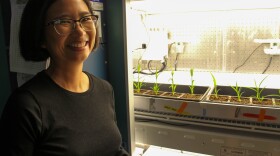-
In 2017, plant scientist, Nadia Shakoor developed the PheNode device, a solar-powered environmental sensor and phenotyping station for crops. Sensors and cameras on the tool take real-time measurements of everything from humidity to soil pH. And this past summer, she won a $1.4 million federal grant to enhance the platform by adding an autonomous drone. It’s called FieldDock. And it just might be a game-changer.
-
William H. Danforth II, who took the reins of Washington University during a period of financial uncertainty and cultural strife and helped defuse animosities by reading bedtime stories to students, has died. He was 94.
-
President Donald Trump signed an executive order last month freezing green cards and some temporary work visas for new immigrants through the end of the…
-
Kevin Cox Jr., 28, asked a lot of questions as a child. He wanted to know how and why things came to be. The plant biologist, a Florissant native, figured…
-
Scientists at the Donald Danforth Plant Science Center and Washington University are studying the long-term consequences of exposing plants to high levels…
-
A recent study from the Donald Danforth Plant Science Center suggests that rising temperatures and carbon dioxide levels could have opposing effects on…
-
St. Louis has established itself as an attractive city for those with fresh ideas who are ready to take risks. Companies in the science, technology,…
-
The Denver-based Wells Fargo Innovation Incubator is expanding its program to St. Louis to support startups doing research in food, water and energy…
-
More than 400 researchers, entrepreneurs and investors are expected to attend Ag Innovation Showcase this week, the 10th year it’s been hosted by the…
-
Researchers at the Donald Danforth Plant Science Center want to learn how a changing climate could affect the fertility of corn and other major…
Play Live Radio
Next Up:
0:00
0:00
Available On Air Stations










